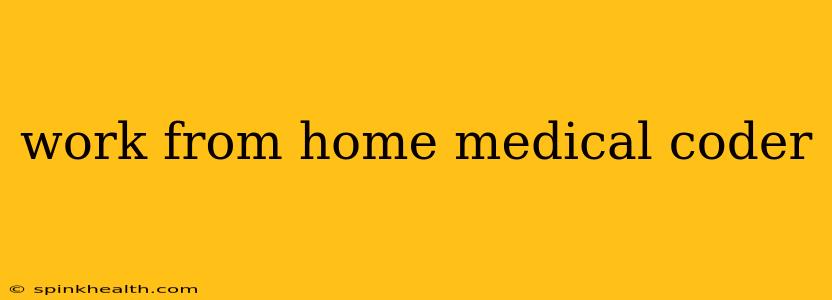The hum of the refrigerator, the gentle chirping of birds outside your window – these are the sounds that accompany many a workday for a medical coder working from home. It's a career path that's exploded in popularity, offering flexibility, independence, and a significant impact on the healthcare industry. But what exactly does it entail, and is it the right fit for you? Let's delve into the world of the work-from-home medical coder.
My journey began unexpectedly. After years in a bustling office environment, I craved a change. The daily commute, the constant interruptions – it all felt stifling. I'd always been meticulous and detail-oriented, and a friend, a medical coder herself, suggested I explore the field. It was a revelation! The work was intellectually stimulating, and the flexibility was unparalleled.
What Does a Medical Coder Do?
A medical coder translates medical diagnoses, procedures, and services into numerical and alphanumeric codes. These codes are crucial for billing insurance companies, tracking patient care, and analyzing healthcare data. Think of them as the language of healthcare finance. Accuracy is paramount, as incorrect coding can lead to denied claims and financial losses for healthcare providers.
This involves meticulous review of medical charts, identifying the correct codes based on established coding systems like ICD-10 (International Classification of Diseases, 10th Revision) and CPT (Current Procedural Terminology), and entering them into billing software.
Is Working From Home as a Medical Coder Right for Me?
This is a question many potential coders ask, and rightfully so. It's a significant career shift, and ensuring it aligns with your personality and skills is crucial.
What are the necessary skills?
- Attention to Detail: Accuracy is the cornerstone of medical coding. One misplaced digit can have significant repercussions.
- Analytical Skills: Deciphering medical records and selecting the appropriate codes requires strong analytical abilities.
- Technical Proficiency: Familiarity with computer software and medical coding systems is essential.
- Medical Terminology Knowledge: Understanding medical terms and procedures is fundamental.
- Organizational Skills: Managing multiple tasks, prioritizing deadlines, and maintaining organized records is crucial for efficiency.
How Do I Become a Work From Home Medical Coder?
The path to becoming a work-from-home medical coder typically involves:
- Education and Training: Many opt for associate degrees, certifications, or online courses in medical coding and billing.
- Certification: Obtaining relevant certifications, such as the Certified Professional Coder (CPC) credential offered by the American Academy of Professional Coders (AAPC), demonstrates competency and enhances job prospects.
- Experience: Gaining experience, whether through internships or entry-level positions, builds practical skills and confidence. Many companies offer remote entry-level positions, making it easier than ever to begin your work-from-home coding journey.
- Networking: Building connections within the healthcare industry can lead to job opportunities.
How Much Do Work From Home Medical Coders Make?
Salaries for medical coders vary depending on experience, location, and employer. While entry-level positions might offer lower pay, experienced coders can command competitive salaries. The flexibility of working from home often offsets any perceived salary differences.
What are the Challenges of Working From Home as a Medical Coder?
Can you find work-from-home medical coding jobs?
Yes, absolutely! Many healthcare companies and medical billing services are increasingly embracing remote work models. Online job boards, company websites, and networking platforms are excellent resources for finding remote positions.
What are the pros and cons of being a work-from-home medical coder?
Pros:
- Flexibility: Set your own hours and work from the comfort of your home.
- Independence: Work at your own pace and manage your workload.
- Work-Life Balance: Better integration of work and personal life.
- Job Security: The healthcare industry constantly needs medical coders.
Cons:
- Isolation: Working from home can sometimes feel isolating.
- Self-Discipline: Requires strong self-discipline and time management skills.
- Technical Issues: Reliance on reliable internet and technology.
Is it possible to work from home as a medical coder without prior experience?
While prior experience is beneficial, it’s not always required. Many companies offer training programs for entry-level coders, and many online resources are available to enhance your skill set.
What certifications are needed to become a work from home medical coder?
While not always mandatory, obtaining certifications such as the CPC (Certified Professional Coder) significantly boosts your credentials and job prospects.
The journey of a work-from-home medical coder is a testament to the evolving landscape of remote work and the constant need for skilled professionals in healthcare. It's a rewarding career path for those seeking flexibility, independence, and the satisfaction of contributing to the efficient functioning of the healthcare system. If you're detail-oriented, analytical, and possess a passion for healthcare, this career path might just be the perfect fit.

